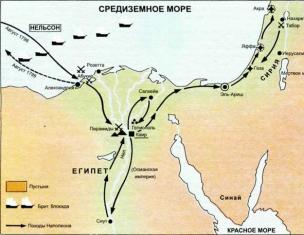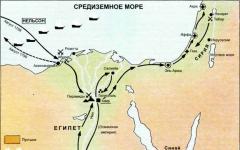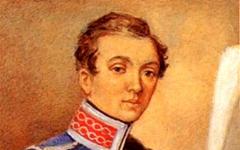On Brumaire 19 (November), 1799, the Council of Five Hundred was dispersed, and General Bonaparte became the unlimited ruler of France for 15 years. Napoleon Bonaparte established a strict authoritarian regime, his power was enormous. Let's see what his power was directed to. What did Napoleon Bonaparte do for France and each Frenchman individually? What has he done for Europe?
View document contents
"The Consulate and the Formation of the Napoleonic Empire"
Municipal educational institution
“Agapovskaya secondary school No. 1im. P.A. Skachkova"
Methodological development of a history lesson in 8th grade
on topic:"The Consulate and the Formation of the Napoleonic Empire"
Completed by: S.T. Kultasova,
history and social studies teacher
Agapovka village
2018
Topic: Consulate and formation of the Napoleonic Empire
Objective of the lesson: Characterize the development of France in the period from 1799 to 1810.
Lesson objectives:
Learn the features of the transition from republic to empire in France;
Show the bourgeois character of Napoleonic reforms. Their significance for the further modernization of France;
Show the aggressive nature of Napoleon's warriors, the territorial changes that occurred in Europe. Continue to develop a respectful attitude towards world culture.
Lesson type: combined
IOrg. moment:
Greetings.
Checking readiness for the lesson.
Motivation.
IIHomework survey:
Guys, in today's lesson we will begin to study one of the most important and most difficult periods of world history - the 19th century. This time brought a huge number of changes to European life. We will learn how the leading European states, namely France, Great Britain, Germany and Italy, developed. This is very difficult material and you will need to make every effort to understand it. The changes that occurred in these countries subsequently led Europe to World War I. And the reasons for this terrible conflict lie directly in this period.
you have been asked § 9-10 Liberals, conservatives and socialists. I give you 5 minutes to repeat the exercise and prepare for the survey. Active children will receive good grades at the end of the lesson.
Frontal survey:
What is liberalism? Ideology of freedom
The main principles of liberalism? h-ka's right to life, liberty, equality, property
What methods did the liberals propose to transform the state. device? Reforms
What word does the name conservative ideology come from? Protect, preserve
The main principles of conservatism. Preservation of traditional values: religion, monarchy, culture, order.
Which utopian socialist thinkers can you name? Saint-Simon, Fourier, Owen
What is socialism?
What is Marxism? Name its founders. Marx, Engels
What methods did the socialists call for overthrowing the old order? Revolution
What is anarchism?
Representatives of anarchism. Proudhon, Bakunin, Kropotkin
IIINew topic:
Teacher's story: Guys, last year you started studying VFR. Let me remind you that as a result of it, the monarchy was overthrown, the French Emperor Louis 16 was executed, and power passed into the hands of the people's representative body. At first it was the National Assembly, then the name changed to the Legislative Assembly, and then to the Directory.
On Brumaire 19 (November), 1799, the Council of Five Hundred was dispersed, and General Bonaparte became the unlimited ruler of France for 15 years. Napoleon Bonaparte established a strict authoritarian regime, his power was enormous. Let's see what his power was directed to. What did Napoleon Bonaparte do for France and each Frenchman individually? What has he done for Europe?
To find out what the Consulate is and what measures the French authorities took at this time, we will do a little work on the options. Option 1 is now reading the paragraph "Calm order legality" second option "Freedom, equality, property." You have 5 minutes to complete the task, after which I will ask you several questions, the answers to which will give you marks.
Questions for group 1 Questions for group 2
What was adopted in 1799? (KC) What laws were passed?
Supreme legislative body (Senate) What is the essence of monetary reform?
Executive branch (3 consuls) Why were the newspapers closed?
What powers do consuls have?
Who was the chief consul (NB)
Consulate - a period in the history of France when power belonged to Napoleon Bonaparte. Lasted from 1799 to 1804.
During the first consulate period the following measures were taken:
Confirmation of the right to property acquired during the revolution;
Encouraging entrepreneurship. The big bourgeoisie was given government contracts.
Monetary reform (creation of a French bank and a new currency - the franc).
Strengthening the police, headed by Fouche, who created a powerful police investigation machine.
The Catholic Church was declared the religion of all French people.
In 1804, the “Civil Code” was created - a set of laws that proclaimed fundamental human rights and freedoms.
Teacher's story: The strengthening of France caused dissatisfaction among European monarchs; they created more and more new coalitions with the goal of returning France to the borders of 1792 and restoring the Bourbon monarchy in it. Napoleon “inherited” the wars waged by France. Guys, remember - the wars that Napoleon had to fight were not only an expression of his personal ambitions and claims to world domination, but a defense of the cause of the French Revolution.
The main enemy of revolutionary France was England, and it was possible to force it to peace not so much by military means as by economic ones. To achieve this, Napoleon imposed a ban on trade with England. This decree on the continental blockade was supposed not only to expel English goods from France, but also to generally strangle the English economy, depriving it of European markets. To achieve results, Napoleon had to ensure that all European states joined the continental blockade, otherwise the plan was doomed to failure. Why do you think Napoleon took such measures?
Exercise. Guys, now you can read the paragraph yourself Wars of conquest of the consulate and empire pp. 96-98 and fill out the table.
Major battles of the Napoleonic wars
| Name of the battle or campaign | Date of battle | Bottom line |
| Battle of Marengo | French victory. Austria left the war. Piedmont and Genoa were annexed to France |
|
| Battle of Ulm | October 1805 | French victory. The Austrian fortress of Ulm was captured |
| Naval battle off Cape Trafalgar | British victory. England secured its status as mistress of the seas |
|
| Battle of Austerlitz | Napoleon defeated the Russian-Austrian troops. Austria capitulated |
|
| Battle of Friedland | French victory. Russia made peace with France. The country's accession to the continental blockade of England |
|
| France invaded Portugal | ||
| France invaded Spain | Establishment of a puppet government. The country's accession to the continental blockade of England |
IVFixing the material.
Questions to consolidate:
What is a consulate?
What measures of Napoleon did you learn?
What battles did we learn about?
VHomework:§ 11 reading, retelling. learn notes in notebooks .
VILesson summary.
- History of Modern Times 8th grade
- From revolutionary France to bourgeois France.
- "Liberty, equality and fraternity!"
- "Revolutionary on the Throne"
- "The True Glory of Napoleon"
- Plan:
- From revolutionary France to bourgeois France
- Since 1789, many revolutions have occurred in France. General Bonaparte was quietly accepted as head of state. He established a military dictatorship and began restoring the economy and legal system.
- Napoleon Bonaparte
- 1 consul
- Napoleon Bonaparte
- 2nd consul
- Emmanuel – Joseph
- Sieyes
- 3 consul
- Roger Ducos
- From revolutionary France to bourgeois France
- Deliberative
- voice
- The First Consul had the greatest rights, who could declare war and make peace, issue laws, appoint and dismiss ministers.
- From revolutionary France to bourgeois France
- First Consul -
- Bonaparte
- During the years of his consulate, legislative power was sharply limited, local self-government was destroyed, and prefects - consular assistants - were sent to departments.
- First Consul -
- Bonaparte
- “Calm, order, nationality!”
- A regime of personal power was established in the country. The French were tired of the revolution, and the regime of personal power was approved in a plebiscite.
- First Consul -
- Bonaparte
- “Let’s write down the definition
- Consulate- a period in the history of France when power belonged to Napoleon Bonaparte. Lasted from November 9, 1799 to May 18, 1804
- During the first period of the consulate the following laws were adopted:
- 1) Confirmation of property rights acquired during the revolution;
- 2) Encouraging entrepreneurship
- Napoleon
- Bonaparte
- Bonaparte carried out monetary reform, including the creation of a French bank and the strengthening of a new currency, the franc.
- "Freedom, equality and property!"
- Currency
- France
- The emperor paid special attention to strengthening the police. Joseph Fouché was placed at the head of the Ministry of Police, creating a powerful police investigation machine.
- Joseph Foucher
- "A society without religion is like a ship without a compass"
- "Revolutionary on the Throne"
- Dedication of Emperor Napoleon I and coronation
- Empress Josephine at Notre Dame Cathedral
- To strengthen the prestige of believers, Bonaparte negotiated with the Pope. The Catholic Church was declared the religion of all French people. In 1805, Napoleon was crowned in Milan in the Duomo.
- First Emperor -
- Bonaparte
- "Revolutionary on the Throne"
- “I can fool both a politician and a military man, but I am not able to deceive a housewife who goes to the market every day.”
- "Revolutionary on the Throne"
- In 1800, Napoleon and his army crossed the Alps, went behind the Austrians and won the Battle of Marengo. France received Piedmont and Genoa.
- Wars of conquest of the consulate and empire
- Battle of Marengo
- In 1805, the battle took place at Cape Trafalgar, as a result of which the French fleet was destroyed, and England rejoiced.
- Wars of conquest of the consulate and empire
- In December 1805, a bloody battle took place near the village of Austerlitz, where Napoleon won a brilliant victory over the Austrian and Russian emperors.
- Wars of conquest of the consulate and empire
- In 1806, the French army entered Prussia and defeated it near Jena. Napoleon solemnly entered Berlin and signed a decree on the continental blockade.
- Wars of conquest of the consulate and empire
- In 1807, Napoleon made peace with Russia. The two emperors met in Tilsit. On the raft they shook hands and signed a peace treaty.
- Wars of conquest of the consulate and empire
- Meeting of the Emperors
- in Tilsit
- In 1808, the French army invaded Spain, and Napoleon installed his older brother Joseph on the Spanish throne.
- Wars of conquest of the consulate and empire
- But the Spaniards did not accept the occupation. The general uprising took the form of guerrilla warfare and limited Joseph's power. The Spaniards did not recognize the power of the impostor king.
- Wars of conquest of the consulate and empire
- Shooting of rebels in
- night of May 3, 1808
- Napoleon in 1804 issued the famous Civil Code, or Napoleonic Code, which proclaimed equality, personal integrity, freedom of conscience, etc.
- Wars of conquest of the consulate and empire
- Working with the document
- Page 89, handout
- Homework:
- Paragraph 11, question 3,5 or 6 in writing
- http://images.rambler.ru/srch?query=%D0%9D%D0%B0%D0%BF%D0%BE%D0%BB%D0%B5%D0%BE%D0%BD
- http://ru.wikipedia.org/wiki/%D0%9D%D0%B0%D0%BF%D0%BE%D0%BB%D0%B5%D0%BE%D0%BD_I
- Antonenkova Anzhelika Viktorovna
- History teacher
- Municipal educational institution Budinskaya secondary school, Tver region.
- Resources used in the work
Consulate in France
The revolution brought many talented and active military leaders to the pinnacle of power. Among them are Bonaparte, Ney, Murat, Davout, Lannes. In December 1799, the country adopted a constitution. Power was transferred to three consuls, the main one of which was the first consul, Napoleon Bonaparte. He was elected to this post for a ten-year term.
Note 1
Napoleon Bonaparte is a French statesman and military leader. Born in 1769 on the island of Corsica. During the years of the revolution, he emerged as a talented commander and became the commander of the army. In 1799, having carried out a coup d'etat, he became the first consul of France. In 1804 he proclaimed himself Emperor of the French. The emperor's military successes ended with an inglorious campaign in Russia in 1812 and the defeat of the French army. He died in 1821 on the island of St. Helena, having been exiled there by decision of the Congress of Vienna.
The consulate retained the republican form of government, although real power was concentrated in the hands of Napoleon. The second and third consuls had an advisory vote. The legislative function was divided between three authorities - the State Council, the Legislative Corps and the Tribunate. The bills they adopted went to the Senate and were then approved by the first consul. All men reaching the age of 21 received the right to vote. True, they elected only candidates for deputies, from among whom the government appointed members to the legislative bodies.
The Constitution of 1799 was approved by popular vote (plebiscite). Most voters voted for Napoleon, who by that time had gained wild popularity. The regime of Bonaparte's personal power was established in the country.
Empire of Napoleon Bonaparte
In 1802, a new plebiscite secured the post of First Consul for life for Napoleon. He could appoint a successor, single-handedly dissolve the Legislative Assembly, and resolve issues of war and peace. All that remained was to give Napoleon the title of emperor. This was done in May 1804. The Pope himself placed the crown on the head of the new emperor. The church glorified first the first consul, then the emperor, turning into a support for the Napoleonic regime.
In 1807, the Tribunate, in which opposition to the Bonaparte regime had formed, was dispersed. The restoration of the pre-revolutionary pomp of the royal court began. The old nobility returned from immigration, the king bestowed titles of nobility on his associates and formed a new elite. Since 1808, 3,600 titles of nobility have been awarded. Napoleon granted land to each newly-made nobleman. But the return of privileges did not happen; Napoleonic laws secured legal equality.
In an effort to strengthen his position and found a new dynasty, Napoleon sought to become related to the “legitimate” monarchs of Europe. The Russian Tsar refused, but the Austrian court agreed to the marriage with Princess Marie-Louise.
The importance of the consulate and the empire for France
Napoleon's regime went down in French history under the name "Bonapartism".
Definition 1
Bonapartism is the military dictatorship of Napoleon Bonaparte at the beginning of the 19th century in France. Later the term came to mean any counter-revolutionary bourgeois dictatorship.
Under Napoleon, the bourgeoisie was not allowed to power. The emperor maneuvered between different classes, relying on the state machine and a strong army. The main rallying point for the people was the revolutionary idea of the unity of the nation. Napoleon implemented his slogan “France First”. Already by 1806, a huge empire was created, not inferior in area to the empire of Charlemagne.
The end of the 18th - beginning of the 19th century is the most important period in the history of France. The ruling groups replaced each other with rapid force and speed. From the Jacobin dictatorship, France passed to the rule of the executive body - the Directory; as a result of the coup of the 18th Brumaire, power fell into the hands of 3 consuls, one of whom was Napoleon Bonaparte. You will learn where the political, economic and foreign policy vectors of France's development will be directed in the future by studying this lesson.
Consulate and formation of the Napoleonic Empire
Background
Since 1789, revolutionary changes took place in France. In 1794, after the overthrow of the Jacobin dictatorship, the shaky regime of the Directory was established.
His features:
.financial crisis, inflation, rapid rise in prices;
.lack of compromise between various political forces in France, fierce political struggle and conspiracies;
The French were largely tired of the internal instability that followed the revolution and wanted strong power;
France achieved its main successes during this period in the military field: the growing popularity of the military against the backdrop of the Directory being unable to cope with the internal problems.
Political circles were increasingly thinking about eliminating the unpopular Directory and establishing a tougher political regime that, with the support of the army, could achieve order in the country.
Events
November 1799 - coup of the 18th Brumaire (about the coup). The popular general Napoleon Bonaparte overthrows the government and disperses the Legislative Assembly; A government of three consuls is established - Bonaparte and former members of the Directory who were preparing the coup: Abbot Sieyès and Roger Ducos.
December 1799 - adoption of the constitution, according to which Napoleon became the first consul with full power, relegating the allies to the background (Constitution of 1799).
1800 - creation of the Bank of France (still exists), stabilization of the financial situation in the country.
1801 - concordat (agreement) between France and the Catholic Church, normalization of relations damaged as a result of the revolution.
1802 - Napoleon declared himself consul for life.
1804 - adoption of the Civil Code, which influenced the civil law system throughout the world ().
Conclusion
In May 1804, Napoleon, in the presence of the Pope, was crowned Emperor Napoleon I. This ended the 12-year history of the First French Republic. A new era in the history of France began - the First Empire.
Parallels
The French themselves of the era of the Revolution and Napoleon liked to compare themselves with the Roman Republic and the Roman Empire. The overthrow of the Bourbons was likened to the expulsion of the royal Tarquin dynasty in Ancient Rome. The struggle of political groups, accompanied by terror, was reminiscent of the period. Bonaparte was compared to Julius Caesar and Octavian Augustus: the Bonapartist regime put an end to internal strife, reconciled various social and political strata, and increased the economic stability and military power of France.
This lesson will focus on the consulate and the creation of the Napoleonic Empire in France. Last year, in the 7th grade general history course, the issue of the French Revolution of 1789 was considered. Let us recall that the King of France Louis XVI was executed in 1793, and in the summer of the same year it was established Jacobin dictatorship(the political regime in revolutionary France that existed from June 1793 to July 1794). After the collapse of the Jacobin dictatorship, a new body came to power in France, which was called Directory(the executive body of the French Republic under the Constitution of the French Republic, adopted by the National Convention in 1795). The era of the Directory in France, which falls on 1795-1799, was not a very successful time. This was a time when an economic crisis was raging in France. By 1799, the Directory had become unpopular in France. What was needed was a person or government body that would enjoy popular support. People wanted to see a strong ruler.
The young general became such a ruler (Fig. 1). Beginning in 1796, he waged active wars in Italy. He also actually forced Switzerland to join France. The French conquest of the Netherlands occurred at the same time. Napoleon's numerous victories and his warlike image aroused delight among a considerable part of French society. Napoleon's finest hour was to be his Egyptian campaign(Fig. 2). If this campaign had been successful, then the British, France's main opponents, would have had serious problems, because France's capture of Egypt opened the way to India for the French army, and India was the most important source of raw materials and resources. But Napoleon's Egyptian campaign ended unsuccessfully. In August 1798, in the Battle of Abukir the British practically destroyed the French fleet (Fig. 3). Attempts to gain a foothold in the eastern Mediterranean failed. However, Napoleon managed to rehabilitate himself. In 1798 and 1799 he undertook two campaigns, in Italy and Switzerland. The enemy of Napoleon and his subordinates in these campaigns was Russia; he was a general in the Russian army at that time (Fig. 4). Despite Suvorov's merits, this campaign was unsuccessful for Russia. Napoleon presented himself to the French as the conqueror of the Russians and Suvorov himself, whose merits were known and honored throughout Europe after the Russian-Turkish War. Thus, by 1799, Napoleon's authority in France was enormous.
Rice. 1. Napoleon Bonaparte ()

Rice. 2. Napoleon's Egyptian campaign ()

Rice. 3. Abukir naval battle ()

Rice. 4. Alexander Vasilievich Suvorov ()
Members of the Directory decided to use this authority for their own purposes. They underestimated Napoleon and decided to use him as a puppet in their hands. In October 1799, Napoleon returned to Paris in triumph. Public opinion associated the victories of recent years with him. But a few days after his return, Napoleon carried out a coup d'etat. It went down in history as the coup of the 18th Brumaire(Fig. 5). The coup happened November 9, 1799. It was announced that the Jacobin conspiracy had been uncovered. The Council of Five Hundred was expelled from the meeting room in the Palace of Saint-Cloud. It was announced that all power in the country would pass into the hands of three individuals, who began to be called in the Roman manner consuls. These consuls were:
Sieyès, who actually brought Napoleon to power,
Roger-Ducos.
This era, which began in 1799 with the coup of the 18th Brumaire and ended in 1804, was called consulate era.

Rice. 5. Coup of the 18th Brumaire ()
The main task that had to be solved in France during the era of the consulate was the task of social unification of the country. In France there were many supporters of various ideas, movements, theories and doctrines. There were monarchists, republicans, and supporters of strong military power.
The new Constitution, adopted by the consuls in 1799, declared the right to property inviolable. As a result, those who previously feared for their lives and their wealth flocked to the country. All emigrants who had previously fled the country were allowed to re-settle in France. An exception was made only for monarchists. Napoleon did not need such rivals.
Napoleon also did a lot to normalize the financial situation in the country. This was primarily of interest to entrepreneurs. But ordinary townspeople were also interested in ensuring that the French monetary unit was stable. In 1800 Napoleon created Bank of France, which still exists today. IN 1803 was put into circulation silver franc(Fig. 6) - convertible (freely exchangeable for other monetary units) currency.

Rice. 6. Silver franc ()
Napoleon managed to solve the problem in his relationship with the Pope. France was and remained a Catholic country with a predominantly Catholic population. Relations with Italy and the pope were unstable. Rome negatively perceived the French Republic and the expulsion of nobles from the country. In 1801, Napoleon and the Pope signed concordat(an agreement between the Pope as the head of the Catholic Church and any state). In 1804, the Pope even came to Paris to conduct the coronation ceremony of Napoleon. However, the services of the pope were not required; Napoleon assumed the crown on his own, but the very presence of the pope at this ceremony was very important for Napoleon. Napoleon, however, believed that he had the right to dispose of church property. The Pope had a completely opposite opinion on this matter.
In 1802, Napoleon received the expected respite. Constant revolutionary wars exhausted the country. A break was needed in order to gather strength and prepare for new military campaigns. Between France and England in 1802 it was concluded Peace of Amiens. This was done in order to strengthen the French position in Italy. Immediately after the signing of the peace treaty, such Italian territories as Piedmont and the island of Elba were annexed to France.
In 1802, the British did not take Napoleon very seriously. They believed that the general would not be able to cope with the economic situation in the country. But they miscalculated. Already in May 1803, Napoleon created a large military camp on the English Channel coast, known as (Fig. 7). This camp is where troops gather for the upcoming invasion of Great Britain.

Rice. 7. Boulogne camp ()
The problem remained in getting these numerous troops across the English Channel (the strait separating England and France, Fig. 8). After the defeat of the French fleet at the Battle of Aboukir, England controlled all movements across the seas, especially off its shores. France did not have a serious fleet at that time. He could not compete with England in numbers and maneuverability. English cartoonists, ridiculing Napoleon's army, depicted the crossing of French troops across the English Channel in landing basins.

Rice. 8. The English Channel separating England and France ()
In March 1804 Napoleon introduced in France Civil code(Fig. 9). This document was prepared by a special commission chaired by Napoleon himself. It enshrined such important provisions as freedom of private property, freedom of enterprise and family law. According to the Civil Code, a new type of family relations was established. Until the beginning of the 19th century, a woman was not considered a subject of law in Europe. It was believed that she should be completely subordinate to her husband or father. Napoleonic Civil Code gave women the right to divorce for the first time in Europe. However, women did not retain this right for very long. It was taken away in 1816 and restored only in 1884. The Civil Code failed to equalize the rights of women with men. Women did not have the right to vote.

Rice. 9. Napoleon's Civil Code ()
Napoleon himself understood the meaning of his Civil Code. He wrote that his military victories may mean nothing, Waterloo alone crossed them all out, and what will live on for centuries is the Civil Code. Following the model of the Civil Code, a few years later the Commercial Code appeared in France, and a little later the Criminal Code.
In 1802, Napoleon achieved an extension of his powers as consul. He received lifelong powers, but this was not enough for the general. On May 18, 1804, he was declared French Emperor under the name NapoleonI. In December, his coronation ceremony took place in Paris (Fig. 10). As noted above, Napoleon himself placed the crown on his head. Thus, France, which was a republic for 12 years, returned to the monarchy again. The period of the first republic in France ended. The period of the first empire began.

Rice. 10. Coronation of Napoleon ()
References
- Jomini. Political and military life of Napoleon. A book dedicated to Napoleon's military campaigns until 1812
- Manfred A.Z. Napoleon Bonaparte. - M.: Mysl, 1989.
- Noskov V.V., Andreevskaya T.P. General history. 8th grade. - M., 2013.
- Tarle E.V. "Napoleon". - 1994.
- Chandler D. Napoleon's military campaigns. - M., 1997.
- Yudovskaya A.Ya. General history. Modern History, 1800-1900, 8th grade. - M., 2012.
- Veter-stranstvii.ru ().
- Jurkom74.ru ().
- Treeland.ru ().
- Be5.biz().
Homework
- Tell us about Napoleon's first military campaigns. Which of them were successful and which were not?
- When did the coup of the 18th Brumaire take place and what regime was established as a result?
- What was the reason for the negative relationship between Napoleon and the Catholic Church (Pope)?
- When was the Civil Code created? What did Napoleon see as its significance for French society?
Question 01. Indicate the reasons for the creation of the empire of Napoleon Bonaparte. Compare the monarchy he restored with the monarchy of Louis XVI.
Answer. Reasons for creating an empire:
1) France needed reconciliation between supporters and opponents of the revolution;
2) Bonaparte used this as one of the means of rehabilitating his regime in the eyes of Catholics;
3) Bonaparte used this as a means of increasing his authority in the international arena (for example, thanks to this title, peace negotiations between the emperors Napoleon I and Alexander I were held on equal terms);
4) it is quite possible that this was the fulfillment of the childhood dream of Napoleon, who was brought up in a monarchical country and always strived for greatness;
5) Bonaparte had full executive power and loyalty to the army at his disposal; no one had a chance to challenge his decisions.
Question 02. Tell us about the internal politics of the consulate and the empire of Napoleon I.
Answer. Bonaparte stimulated the development of large business, taking a whole range of measures for this, including strengthening the franc. At the same time, he launched large-scale state construction, which has been used since ancient times to give work to the poor. The creation of new jobs also stimulated the development of business for the big bourgeoisie, which, I repeat, was supported by the government. Bonaparte also decided to make peace with moderate opponents of the revolution. He declared an amnesty for emigrants and also tried to improve relations with the Catholic Church. The latter included a whole range of measures. The first consul went to negotiations with the Pope. Later, the Pope presided over the emperor's coronation ceremony. After a series of military victories by France, the Roman high priest became under the control of Paris, while he was glorified and supported in every possible way in endeavors that did not diverge from the political course of the empire. The separation of church and state in France was abolished, the positions of the Catholic hierarchs were formally restored, but, for example, Napoleon personally appointed bishops. Taking advantage of his right to make laws independently, Napoleon introduced a number of codes with new norms of social relations in France and in the territories under its control. His code contained many of the gains of the revolution in the field of civil law and personal freedoms; it was precisely such freedoms that the revolutionary movements of many countries sought after the end of the Napoleonic Wars.
Question 03. What measures did the continental blockade include? What goals did Napoleon set when resorting to this policy? Make your forecast for the development of international relations in connection with its application.
Answer. Napoleon hoped to deprive Britain of money to continue the war. To do this, he banned all countries under his control from any trade relations with these territories subordinate to London. However, such measures were not beneficial, first of all, to continental countries: they were too dependent on English goods, while English industry could find new markets in their own and foreign colonies. That is why Russia did not actually observe the blockade. From this we can conclude that continuing the blockade would only lead to the ruin of the countries supporting the blockade. Napoleon also understood this, and therefore, according to the recollections of some contemporaries, he made plans to conquer the British colonies, primarily India.
Question 04. Start compiling the table “Foreign Policy of the Consulate and the Empire.” Table columns: years, main events in foreign policy, results, significance.
Answer. Foreign policy of the consulate and the empire









